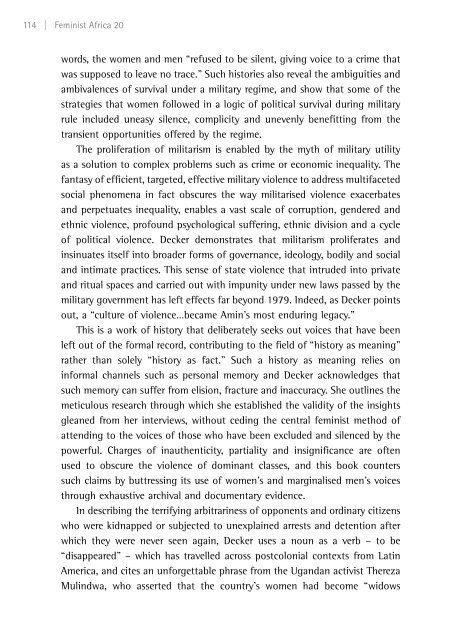You also want an ePaper? Increase the reach of your titles
YUMPU automatically turns print PDFs into web optimized ePapers that Google loves.
114 | Feminist Africa 20<br />
words, the women <strong>and</strong> men “refused to be silent, giving voice to a crime that<br />
was supposed to leave no trace.” Such histories also reveal the ambiguities <strong>and</strong><br />
ambivalences of survival under a military regime, <strong>and</strong> show that some of the<br />
strategies that women followed in a logic of political survival during military<br />
rule included uneasy silence, complicity <strong>and</strong> unevenly benefitting from the<br />
transient opportunities offered by the regime.<br />
The proliferation of militarism is enabled by the myth of military utility<br />
as a solution to complex problems such as crime or economic inequality. The<br />
fantasy of efficient, targeted, effective military violence to address multifaceted<br />
social phenomena in fact obscures the way militarised violence exacerbates<br />
<strong>and</strong> perpetuates inequality, enables a vast scale of corruption, gendered <strong>and</strong><br />
ethnic violence, profound psychological suffering, ethnic division <strong>and</strong> a cycle<br />
of political violence. Decker demonstrates that militarism proliferates <strong>and</strong><br />
insinuates itself into broader forms of governance, ideology, bodily <strong>and</strong> social<br />
<strong>and</strong> intimate practices. This sense of state violence that intruded into private<br />
<strong>and</strong> ritual spaces <strong>and</strong> carried out with impunity under new laws passed by the<br />
military government has left effects far beyond 1979. Indeed, as Decker points<br />
out, a “culture of violence…became Amin’s most enduring legacy.”<br />
This is a work of history that deliberately seeks out voices that have been<br />
left out of the formal record, contributing to the field of “history as meaning”<br />
rather than solely “history as fact.” Such a history as meaning relies on<br />
informal channels such as personal memory <strong>and</strong> Decker acknowledges that<br />
such memory can suffer from elision, fracture <strong>and</strong> inaccuracy. She outlines the<br />
meticulous research through which she established the validity of the insights<br />
gleaned from her interviews, without ceding the central feminist method of<br />
attending to the voices of those who have been excluded <strong>and</strong> silenced by the<br />
powerful. Charges of inauthenticity, partiality <strong>and</strong> insignificance are often<br />
used to obscure the violence of dominant classes, <strong>and</strong> this book counters<br />
such claims by buttressing its use of women’s <strong>and</strong> marginalised men’s voices<br />
through exhaustive archival <strong>and</strong> documentary evidence.<br />
In describing the terrifying arbitrariness of opponents <strong>and</strong> ordinary citizens<br />
who were kidnapped or subjected to unexplained arrests <strong>and</strong> detention after<br />
which they were never seen again, Decker uses a noun as a verb – to be<br />
“disappeared” – which has travelled across postcolonial contexts from Latin<br />
America, <strong>and</strong> cites an unforgettable phrase from the Ug<strong>and</strong>an activist Thereza<br />
Mulindwa, who asserted that the country’s women had become “widows


